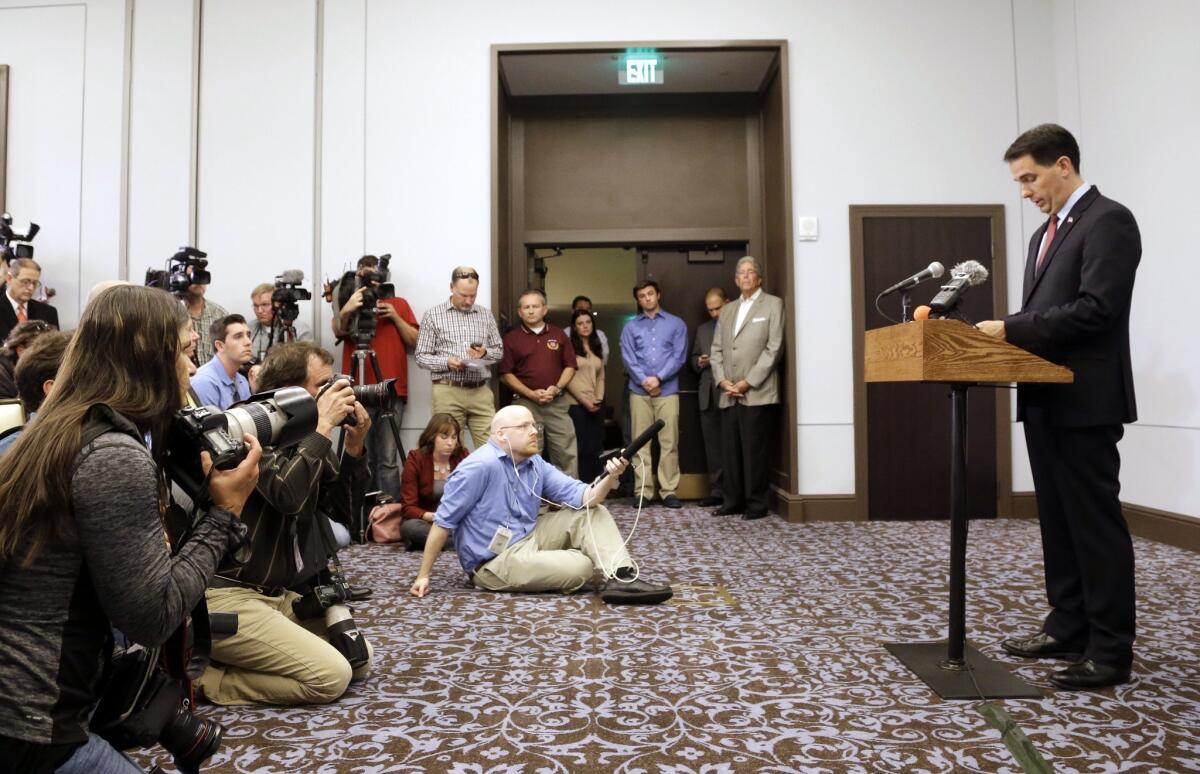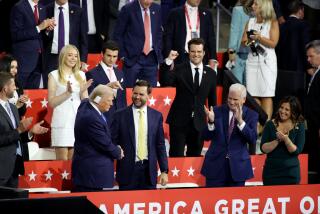Column: Why did voters abandon Scott Walker? He wasn’t up for the job.

Wisconsin Gov. Scott Walker speaks at a news conference on Monday, Sept. 21, in Madison, Wis., where he announced that he is suspending his Republican presidential campaign.
Five months ago, Wisconsin Gov. Scott Walker stood atop the national polls for the Republican presidential nomination. Less than two months ago, he was the front-runner in Iowa, where the first caucuses will be held next year. Yet on Monday, Walker abruptly dropped out of the presidential race after one of the most precipitous collapses in modern electoral history.
In a GOP campaign that has been chaotic and untraditional, Walker fell for old-fashioned reasons: He was losing support from voters and running out of money. And that, paradoxically, may be good news for establishment Republicans. It suggests that, even in this year of Donald Trump and Ben Carson, the traditional laws of politics haven’t been suspended after all.
Voters abandoned Walker because, quite simply, he wasn’t up to the job.
He made a thrilling first impression on conservatives last spring by talking about his success in fighting Wisconsin’s public employee unions. But he didn’t really have a second paragraph: a distinctive list of other things he’d do as president.
Instead, he stumbled, especially on foreign policy. On a trip to London, he refused to talk about international issues; in a television interview, he said he favored “an aggressive strategy” in Syria but couldn’t offer any details.
On domestic policies, he lunged to the right, and he improvised. He took three different positions on birthright citizenship in the course of a single week. He said he’d consider building a wall on the border with Canada.
The newfound positions weren’t convincing. It was impossible for Walker to appear more truculent than Trump or more conservative than Sen. Ted Cruz (R-Texas). Worse, he looked like a man with no clear convictions.
One of his former campaign aides, Republican operative Liz Mair, drew up a rapid-fire list of his failings on Twitter. “Things he got wrong: Misunderstanding the GOP base, its priorities and stances,” she wrote. “Pandering. Flip-flopping. Not educating himself fast enough.”
So, in this case, the campaign worked the way campaigns are supposed to. Voters got a good look at Walker and appear to have deserted him for substantive reasons.
The second potentially encouraging lesson from Walker’s fall is that “super PAC” money isn’t everything. Earlier this year, as campaigns raised millions of dollars under new rules allowing unlimited donations, it looked as if no candidate would ever need to drop out because of dwindling funds, laying the groundwork for a long, overcrowded race, and increasing the chances that an outsider like Trump would win.
But Walker was the second candidate to drop out after his campaign ran into a cash squeeze. (Former Texas Gov. Rick Perry was the first.) So contrary to the fears of some pundits (including me), weak candidates won’t be able to stay in the race forever.
The Wisconsin governor’s withdrawal should also serve as a reminder that, at this still-early stage in the campaign, most voters are only window-shopping. Walker found that out himself when he talked with voters in Iowa last month. “You’ll find people saying, you know what, you’re one of my top two or three candidates,” he recounted in a television interview a few days before he withdrew. “I think they’re interested in me; I think they’re interested in Ben Carson and Ted Cruz and Marco Rubio.”
And that underscores an equally important lesson: This year’s polls can’t predict next year’s primary elections. Four years ago, in the 2012 election cycle, Perry was the front-runner in national polls. Four years before that, the front-runner was former New York Mayor Rudolph Giuliani. Those precedents should worry Trump.
Indeed, as political analyst Charlie Cook pointed out in the National Journal on Monday, recent polls suggest that Trump and Carson are no longer gaining ground.
“The Trump-Carson surge is no longer snowballing and may have topped out, while other candidates are starting to pick up support,” Cook wrote. “Support for the candidates who are most anti-establishment may have reached — or passed — its peak.”
In his announcement Monday, Walker appealed to some of his colleagues to drop out so “voters can focus on a limited number of candidates who can offer a positive conservative alternative” to Trump.
That’s not likely to happen right away. The other “establishment” candidates, including former Florida Gov. Jeb Bush, Florida Sen. Marco Rubio and Ohio Gov. John Kasich, are busy scooping up Walker’s abandoned supporters, donors and fundraisers. Still, Walker’s decision suggests that the winnowing process has officially begun.
Twitter: @doylemcmanus
Follow the Opinion section on Twitter @latimesopinion and Facebook
More to Read
A cure for the common opinion
Get thought-provoking perspectives with our weekly newsletter.
You may occasionally receive promotional content from the Los Angeles Times.











